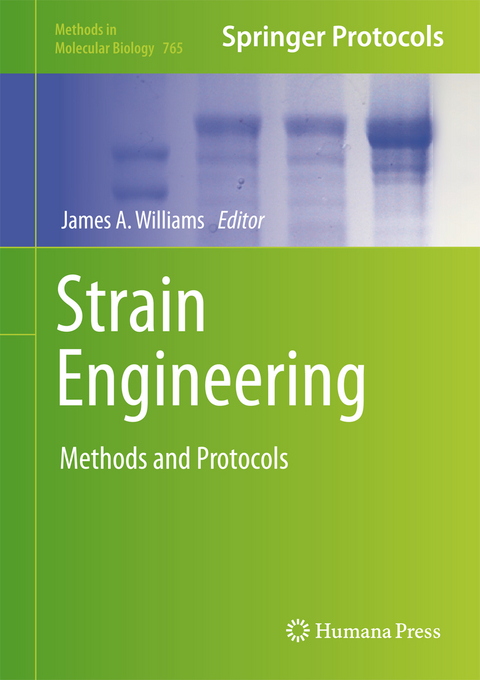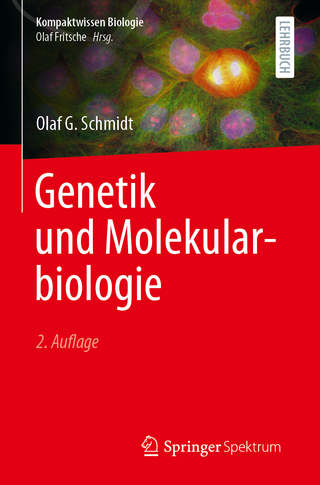
Strain Engineering
Humana Press Inc. (Verlag)
978-1-61779-196-3 (ISBN)
Authoritative and accessible, Strain Engineering: Methods and Protocols serves as an ideal guide to scientists in academia, pharmaceutical science, and biotechnology who perform microbial strain engineering.
Bacterial Genome Reengineering.- Targeted Chromosomal Gene Knockout using PCR Fragments.- Scarless Chromosomal Gene Knockout Methods.- Random Chromosomal Gene Disruption In vivo using Transposomes.- Genome Engineering using Targeted Oligonucleotide Libraries and Functional Selection.- Microarray-based Genetic Footprinting Strategy to Identify Strain Improvement Genes after Competitive Selection of Transposon Libraries.- Optimization of Synthetic Operons using Libraries of Post-Transciptional Regulatory Elements.- Marker Free Chromosomal Expression of Foreign and Native Genes in E. coli.- Array-based Synthetic Genetic Screens to Map Bacterial Pathways and Functional Networks in Escherichia coli.- Assembling New E. coli Strains by Transduction using Phage P1.- Yeast Bioinformatics and Strain Engineering Resources.- Delete and Repeat: A Comprehensive Toolkit for Sequential Gene Knock-out in the Budding Yeast Saccharomyces cerevisiae.- Genome-wide Transposon Mutagenesis in Saccharomyces cerevisiae and Candida albicans.- Signature-tagged Mutagenesis to Characterize Genes Through Competitive Selection of Barcoded Genome Libraries.- Global Strain Engineering by Mutant Transcription Factors.- Genomic Promoter Replacement Cassettes to Alter Gene Expression in the Yeast Saccharomyces cerevisiae.- Microbial Genome Analysis and Comparisons: Web-based Protocols and Resources.- Plasmid Artificial Modification: A Novel Method for Efficient DNA Transfer into Bacteria.- Broad-host-range Plasmid Vectors for Gene Expression in Bacteria.- Simple Method for Introducing Marker-free Deletions in the Bacillus subtilis Genome.- Transposon-mediated Random Mutagenesis of Bacillus subtilis.- Integrative Food Grade Expression System for Lactic Acid Bacteria.- ClosTron-mediated Engineering of Clostridium.- High Throughput Transposon Mutagenesis of Corynebacterium glutamicum.- Mini-Mu Transposon Mutagenesis of Ethanologenic Zymomonas mobilis.- Engineering Thermoacidophilic Archaea using Linear DNA Recombination.- Targeted Gene Disruption in Koji Mold Aspergillus oryzae.- Selectable and Inheritable Gene Silencing through RNA Interference in the Unicellular Alga Chlamydomonas reinhardtii.
| Reihe/Serie | Methods in Molecular Biology ; 765 |
|---|---|
| Zusatzinfo | 2 Illustrations, color; 81 Illustrations, black and white; XI, 480 p. 83 illus., 2 illus. in color. |
| Verlagsort | Totowa, NJ |
| Sprache | englisch |
| Maße | 178 x 254 mm |
| Themenwelt | Medizin / Pharmazie ► Medizinische Fachgebiete |
| Studium ► 2. Studienabschnitt (Klinik) ► Humangenetik | |
| Technik ► Umwelttechnik / Biotechnologie | |
| ISBN-10 | 1-61779-196-2 / 1617791962 |
| ISBN-13 | 978-1-61779-196-3 / 9781617791963 |
| Zustand | Neuware |
| Haben Sie eine Frage zum Produkt? |
aus dem Bereich


